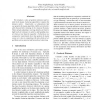Free Online Productivity Tools
i2Speak
i2Symbol
i2OCR
iTex2Img
iWeb2Print
iWeb2Shot
i2Type
iPdf2Split
iPdf2Merge
i2Bopomofo
i2Arabic
i2Style
i2Image
i2PDF
iLatex2Rtf
Sci2ools
ICPR
2008
IEEE
2008
IEEE
Geodesic K-means clustering
We introduce a class of geodesic distances and extend the K-means clustering algorithm to employ this distance metric. Empirically, we demonstrate that our geodesic K-means algorithm exhibits several desirable characteristics missing in the classical K-means. These include adjusting to varying densities of clusters, high levels of resistance to outliers, and handling clusters that are not linearly separable. Furthermore our comparative experiments show that geodesic K-means comes very close to competing with state-of-the-art algorithms such as spectral and hierarchical clustering.
Computer Vision | Geodesic K-means | ICPR 2008 | K-means Algorithm Exhibits | K-means Clustering Algorithm |
Related Content
| Added | 05 Nov 2009 |
| Updated | 05 Nov 2009 |
| Type | Conference |
| Year | 2008 |
| Where | ICPR |
| Authors | Arian Maleki, Nima Asgharbeygi |
Comments (0)

